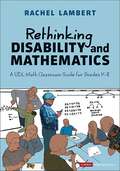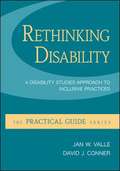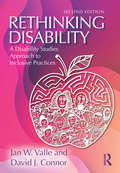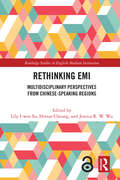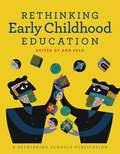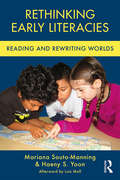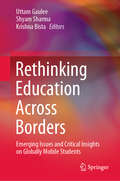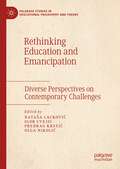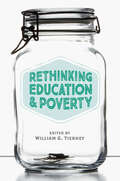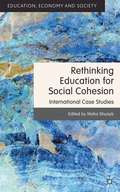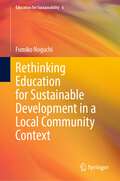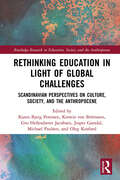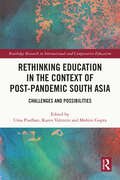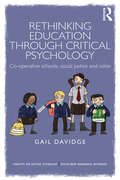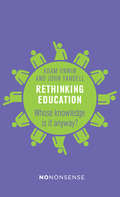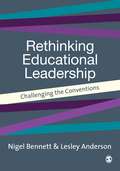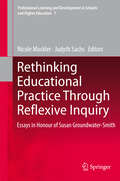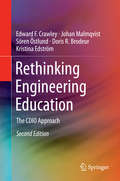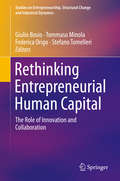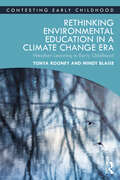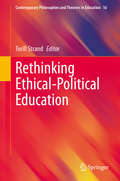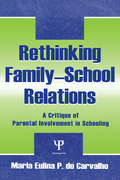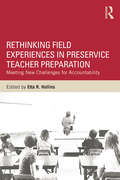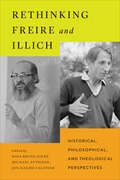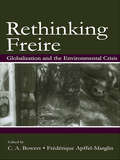- Table View
- List View
Rethinking Disability and Mathematics: A UDL Math Classroom Guide for Grades K-8 (Corwin Mathematics Series)
by Rachel LambertEvery child has a right to make sense of math, and to use math to make sense of their worlds. Despite their gifts, students with disabilities are often viewed from a deficit standpoint in mathematics classrooms. These students are often conceptualized as needing to be fixed or remediated. Rethinking Disability and Mathematics argues that mathematics should be a transformative space for these students, a place where they can discover their power and potential and be appreciated for their many strengths. Author Rachel Lambert introduces Universal Design for Learning for Math (UDL Math), a way to design math classrooms that empowers disabled and neurodiverse students to engage in mathematics in ways that lead to meaningful and joyful math learning. The book showcases how UDL Math can open up mathematics classrooms so that they provide access to meaningful understanding and an identity as a math learner to a wider range of students. Weaved throughout the book are the voices of neurodiverse learners telling their own stories of math learning. Through stories of real teachers recognizing the barriers in their own math classrooms and redesigning to increase access, the book: Reframes students with disabilities from a deficit to an asset perspective, paving the way for trusting their mathematical thinking Offers equitable math instruction for all learners, including those with disabilities, neurodiverse students, and/or multilingual learners Applies UDL to the math classroom, providing practical tips and techniques to support students′ cognitive, affective, and strategic development Immerses readers in math classrooms where all students are engaged in meaningful mathematics, from special education day classes to inclusive general education classrooms, from grades K-8. Integrates research on mathematical learning including critical math content such as developing number sense and place value, fluency with math facts and operations, and understanding fractions and algebraic thinking. Explores critical issues such as writing IEP goals in math This book is designed for all math educators, both those trained as general education teachers and those trained as special education teachers. The UDL Math approach is adapted to work for all learners because everyone varies in how they perceive the world and in how they approach mathematical problem solving. When we rethink mathematics to include multiple ways of being a math learner, we make math accessible and engaging for a wider group of learners.
Rethinking Disability: A Disability Studies Approach to Inclusive Practices
by Jan Valle David ConnorIn a series aimed at pre-service and beginning in-service teachers that is meant to boost teacher retention, this volume by Valle (City College, City U. of New York) and Conner (Hunter College, City U. of New York) brings together theory and practice in explaining how and why to implement inclusive education. They discuss inclusion through the frame of disability studies in education, which offers new ways to think about disability as a marker of identity and inclusive practices through a social model. They address the effects of teachers' knowledge, beliefs, and values on practice; misperceptions of disability; problems with the medical model of disability; how to create inclusive classrooms through classroom culture, assessment, and co-teaching; and acknowledging disability as part of diversity. Annotation ©2010 Book News, Inc. , Portland, OR (booknews. com)
Rethinking Disability: A Disability Studies Approach to Inclusive Practices
by David J. Connor Jan W. ValleNow in its second edition, Rethinking Disability introduces new and experienced teachers to ethical framings of disability and strategies for effectively teaching and including students with disabilities in the general education classroom. Grounded in a disability studies framework, this text’s unique narrative style encourages readers to examine their beliefs about disability and the influence of historical and cultural meanings of disability upon their work as teachers. The second edition offers clear and applicable suggestions for creating dynamic and inclusive classroom cultures, getting to know students, selecting appropriate instructional and assessment strategies, co-teaching, and promoting an inclusive school culture. This second edition is fully revised and updated to include a brief history of disability through the ages, the relevance of current educational policies to inclusion, technology in the inclusive classroom, intersectionality and its influence upon inclusive practices, working with families, and issues of transition from school to the post-school world. Each chapter now also includes a featured "voice from the field" written by persons with disabilities, parents, and teachers.
Rethinking EMI: Multidisciplinary Perspectives from Chinese-Speaking Regions (Routledge Studies in English-Medium Instruction)
by Su, Lily I-wenDue to the competitive edge it confers on students, educational institutions, and non-English speaking nations in a globalized economy, English as a medium of instruction (EMI) has been gaining popularity in tertiary education in non-native English-speaking (NNES) countries. Institute-wide EMI implementation has often been imposed by top-down decisions, in combination with the optimistic view that the horse should always be placed before the cart. However, emerging evidence suggests that the delivery of such programs to NNES students has led to new pedagogical challenges and learning problems that go beyond the scope of language learning and teaching and deserve immediate attention. For example, how would an instructor respond to situations in which students’ learning of content is compromised by their limited language proficiency? This book draws on the current practice of EMI in diverse disciplines and university settings and examines how these new pedagogical and learning issues can be addressed. The discussion also involves a reflection on the essence of EMI in relation to the use of the first language (L1) as the medium of instruction in tertiary education. In addition, the book includes discussion about how to ensure and maintain the quality of EMI programs and assess the readiness of stakeholders for such programs, which include administrators, teachers, and students. The discussion is led by exemplars in Hong Kong and Taiwan, where the majority of students are native Chinese speakers, in the hope of developing critical perspectives and practical guidelines as references for EMI in other NNES settings.
Rethinking Early Childhood Education
by Ann PeloIt shows how educators can nurture empathy, ecological consciousness, curiosity, collaboration, and activism in young children. It invites readers to rethink early childhood education, reminding them that it is inseparable from social justice and ecological education. An outstanding resource for childcare providers, early-grade teachers, and teacher education and staff development programs.
Rethinking Early Literacies: Reading and Rewriting Worlds (Changing Images of Early Childhood)
by Mariana Souto-Manning Haeny S. YoonRethinking Early Literacies honors the identities of young children as they read, write, speak, and play across various spaces, in and out of pre/school. Despite narrow curricular mandates and policies, the book highlights the language resources and tools that children cultivate from families, communities, and peers. The chapters feature children’s linguistic flexibility with multiple languages, creative appropriation of popular culture, participation in community literacy practices, and social negotiation in the context of play. Throughout the book, the authors critically reframe what it means to be literate in contemporary society, specifically discussing the role of educators in theorizing and rethinking language ideologies for practice. Issues influencing early childhood education in trans/national contexts are forefronted (e.g. racism, immigration rights, readiness) throughout the book, with a call to support and sustain communities of color.
Rethinking Education Across Borders: Emerging Issues and Critical Insights on Globally Mobile Students
by Shyam Sharma Krishna Bista Uttam GauleeThis book focuses on critical issues and perspectives concerning globally mobile students, aspects that have grown in importance thanks to major geopolitical, economic, and technological changes around the globe (i.e., in and across major origins and destinations of international students). Over the past few decades, the field of international higher education and scholarship has developed robust areas of research that guide current policy, programs, and pedagogy. However, many of the established narratives and wisdoms that dominate research agendas, scope, and foci have become somewhat ossified and are unable to reflect recent political upheavals and other changes (e.g. the Brexit, Trump era, and Belt and Road Initiative) that have disrupted a number of areas including mobility patterns and recruitment practices, understanding and supporting students, engagement of global mobile students with their local counterparts, and the political economy of international education at large. By re-assessing established issues and perspectives in light of the emerging global/local situations, the contributing authors – all experts on international education – share insights on policies and practices that can help adapt to emerging challenges and opportunities for institutions, scholars, and other stakeholders in international higher education. Including theoretical, empirical, and practitioner-based methods and perspectives provided by scholars from around the world, the book offers a unique and intriguing resource.
Rethinking Education and Emancipation: Diverse Perspectives on Contemporary Challenges (Palgrave Studies in Educational Philosophy and Theory)
by Nataša Lacković Igor Cvejic Predrag Krstić Olga NikolićThis edited collection responds to the contemporary need for deeper analysis and rethinking of the relation between education and emancipation in a world beset by social, digital, educational and ecological crises. Among the diverse interdisciplinary perspectives explored are: rethinking the Anthropocene in the time of environmental emergency, the concept of relational thinking as emancipatory practice and a more encompassing concept of relational pedagogy that includes questions about the environment and digitalisation, the notion of indoctrination from the perspective of political education, reconnecting with the body as a form of emancipatory education and how schools reproduce socio-cultural ideologies in synergy with material and visual culture. The book chapters also consider the role of social media, postcolonialism and feminism in understanding emancipatory education and a historical reception of John Dewey’s ideas in other than Western contexts. This volume will be of interestto those seeking well-known as well as further and novel acquaintance with the philosophical and critical issues surrounding different forms and ideas of emancipation and/or/through education, including related practical propositions and examples. Educators, scholars in education, social justice, philosophy, sociology and curriculum developers will find this collection valuable in contemplating, practising and theorising the futures of emancipatory education across contexts and themes.
Rethinking Education and Poverty: Edited By William G. Tierney
by William G. TierneyHow can new ways of thinking about education improve the lives of poor students?In Rethinking Education and Poverty, William G. Tierney brings together scholars from around the world to examine the complex relationship between poverty and education in the twenty-first century. International in scope, this book assembles the best contemporary thinking about how education can mediate class and improve the lives of marginalized individuals.In remarkably nuanced ways, this volume examines education's role as both a possible factor in perpetuating—and a tool for alleviating—entrenched poverty. Education has long been seen as a way out of poverty. Some critics, however, argue that educational systems mask inequality and perpetuate cycles of poverty and wealth; others believe that the innate resilience or intellectual ability of impoverished students is what allows those individuals to succeed. Rethinking Education and Poverty grapples in turn with the ramifications of each possibility.Throughout these compelling, far-reaching, and provocative essays, the contributors seek to better understand how local efforts to reduce poverty through education interact—or fail to interact—with international assessment efforts. They take a broad historical view, examining social, economic, and educational polices from the postWorld War II period to the end of the Cold War and beyond. Although there is no simple solution to inequality, this book makes clear that education offers numerous exciting possibilities for progress.
Rethinking Education for Social Cohesion
by Maha ShuaybThis book addresses current debates in the field of social cohesion. It examines the ethics and policy making of social cohesion and explores various means for promoting social cohesion including history education, citizenship education, language, human rights based teacher training and school partnerships.
Rethinking Education for Sustainable Development in a Local Community Context (Education for Sustainability #6)
by Fumiko NoguchiThis book bridges the gap between Education for Sustainable Development and community development and examines the contributions of critical environmental education as a theoretical framework to the policy, research, and practice of Education for Sustainable Development. The book investigates what Education for Sustainable Development really means when it happens from the perspectives of a marginalized individual at the very bottom of society in a local community, where there is no such ‘educational’ institution, no policy or no curriculum to support the effort, but there is the necessity of learning and empowerment for changing the situation. In particular, drawing on the experience of the indigenous Ainu fisherman, it critically examines the theoretical foundation of Education for Sustainable Development, critical environmental education, investigating methodologically and epistemologically the relevance and efficacy of critical environmental education to socially critical approaches to Education for Sustainable Development in a community development context. And this investigation leads to develop a praxis framework for socially critical Education for Sustainable Development in a community development context so that both fields would be mutually supportive to strengthen the practices.
Rethinking Education in Light of Global Challenges: Scandinavian Perspectives on Culture, Society, and the Anthropocene (Routledge Research in Education, Society and the Anthropocene)
by Karen Bjerg PetersenRethinking Education in Light of Global Challenges discusses challenges to education in Scandinavian welfare states due to global trends like migration, neoliberal strategies, and the exploitation of nature. This anthology comprises case studies, theoretical articles, and reflective studies, grouped under the headings of Culture, Society, and the Anthropocene. This book directly addresses three interrelated global events and their implications for education as seen from Scandinavian perspectives: migration flows, increased cultural diversity, and (post)nationalism; the erosion of the welfare state and the global rise of neoliberalism; and the Anthropocene and environmental challenges arising in the wake of the global exploitation of natural ecosystems. In case studies, theoretical articles, and reflective studies, researchers from Nordic countries explore how education, education policy, and educational thinking in these countries are affected by these global trends, bringing to the fore the different roles education can play in addressing the various issues and different ways of reimagining education. This authoritative volume will be of great interest to researchers, academics, and students in the fields of sociology of education, migration and education, environmental education, and educational politics.
Rethinking Education in the Context of Post-Pandemic South Asia: Challenges and Possibilities (Routledge Research in International and Comparative Education)
by Karen Valentin Uma Pradhan Mohini GuptaThis edited volume offers new analytical and methodological approaches to the study of education in the post-pandemic educational context, through case studies from countries in South Asia such as Bhutan, India, Nepal, Pakistan and Sri Lanka. Crossing disciplinary and national boundaries to advance collaborative knowledge production in South Asian education, the book explores how different colonial legacies, religious orientations, and positions in the global economy are played out in regional education systems. In doing so, this volume focuses on the educational challenges faced by the region to better understand South Asian society and the existing societal inequalities in the wake of COVID-19. The book highlights how the pandemic invites a re-thinking of current ways of approaching educational research in hybrid forms, and also opens up new areas of research ranging from pedagogical innovations to the well-being of teachers and students. Offering interdisciplinary perspectives on education in this unique context, this timely book will be highly relevant to students, researchers, and academics in the fields of international and comparative education, South Asian studies, teacher education, and education policy and politics.
Rethinking Education through Critical Psychology: Cooperative schools, social justice and voice (Concepts for Critical Psychology)
by Gail DavidgeSince the very first ‘co-operative’ school opened its doors in 2008, the complicated relations between ‘co-operative’ approaches to schooling and democratic subjectivity remain unexplored. This ground breaking book considers the role of ‘voice’ in co-operative schooling and its place in radical research, offering an original, critical analysis of an alternative model of ‘co-operative’ schooling set within the context of the contemporary public education sector in England. Drawing on post structural theory and critical ethnographic research, the author explores how this model might offer new ways of thinking about what education is for and who stands to benefit or lose when schools adopt co-operative ways of working together across the structures of governance, pedagogy and curriculum. The book considers how participatory ways of working in education might inform a more critical educational psychology that takes engendering equality and collective well-being as an alternative starting point to measuring individual achievement and cognitive development. This text will appeal to advanced level undergraduate and postgraduate students, researchers and practitioners, particularly in the field of psychology, education, politics and social research, with an interest in developing a critical appreciation of inequalities in education and in reimagining the possibilities for change.
Rethinking Education: Whose Knowledge Is It Anyway? (No-Nonsense Guides #38)
by Adam Unwin John YandellWhat is knowledge? Who decides what is important? Who owns it? These key questions are central themes in this accessible book that aims to change perceptions and the understanding of education. Using historical and contemporary examples the authors examine the motivations, conflicts, and contradictions in education. Breaking down the structures, forces, and technologies involved in education they chart an alternative approach.
Rethinking Educational Leadership: Challenging the Conventions (Published in association with the British Educational Leadership and Management Society)
by Lesley Anderson Nigel BennettThe charismatic transformational leader, who creates a ′vision′ for the future of their organization and persuades others to follow their path towards it, is now the dominant viewpoint that underpins government policies towards leadership development in the English-speaking world. This book offers a much-needed corrective to this orthodoxy by focusing on current research and thinking about ′leadership′ rather than ′leaders. A wide range of prominent international contributors present a rare self critical look at their own assertions and test alternative leadership models against recent research projects. They also demonstrate how their analysis is relevant to all countries where leadership is an issue. Major features include: ] alternative theories to understanding the nature of leadership ] how leadership could be analyzed ] re-analysis of recent research carried out by contributors in the light of one or more of the alternative theories examined ] implications of the alternative perspectives for leadership training This book is recommended to all staff and students involved in educational leadership, management or administration programmes.
Rethinking Educational Practice Through Reflexive Inquiry
by Nicole Mockler Judyth SachsSusan Groundwater-Smith is one of the most influential voices in the world of educational practitioner inquiry. The convener in Australia of the Coalition of Knowledge Building Schools, she is a staunch advocate of innovative methods of practitioner inquiry with a particular emphasis upon student voice and the use of images in capturing young people's perspectives on their learning experience. So it is more than fitting that this unique text on practitioner inquiry and teacher professional learning is dedicated to her. Rethinking Education Practice Through Reflexive Inquiry is a compilation of essays that explore contemporary issues in practitioner inquiry and action research from the perspective of both university-based and school-based authors. The essays discuss the practical, political and theoretical dimensions of practitioner inquiry, advancing the argument that the adoption of an inquiring approach to practice is both an integral dimension of teachers' work in the modern school as well as critical to effective and authentic professional learning. And the essays draw on the work of Groundwater-Smith to demonstrate the benefits brought to bear on schools, teachers and learners when the complex nature of the relationship between inquiry and practice is understood and acted upon in pursuit of democratic knowledge interests.
Rethinking Engineering Education
by Edward F. Crawley Johan Malmqvist Sören Östlund Doris R. Brodeur Kristina EdströmThis book describes an approach to engineering education that integrates a comprehensive set of personal, interpersonal, and professional engineering skills with engineering disciplinary knowledge in order to prepare innovative and entrepreneurial engineers. The education of engineers is set in the context of engineering practice, that is, Conceiving, Designing, Implementing, and Operating (CDIO) through the entire lifecycle of engineering processes, products, and systems. The book is both a description of the development and implementation of the CDIO model and a guide to engineering programs worldwide that seek to improve the education of young engineers.
Rethinking Entrepreneurial Human Capital: The Role of Innovation and Collaboration (Studies on Entrepreneurship, Structural Change and Industrial Dynamics)
by Giulio Bosio Tommaso Minola Federica Origo Stefano TomelleriThis book focuses on the specific traits and nature of entrepreneurial human capital and the extent to which it can be stimulated by entrepreneurship education – especially when these activities combine collaborative practices and innovation. It includes a comprehensive collection of articles on how entrepreneurship education can be structured, providing theoretical reflections as well as empirical evidence. As such it contributes to the ongoing debate on the teachability of entrepreneurial skills and the role of innovation and collaboration in the design of educational programs that aim to spread entrepreneurial human capital.
Rethinking Environmental Education in a Climate Change Era: Weather Learning in Early Childhood (Contesting Early Childhood)
by Mindy Blaise Tonya RooneyAs the impact of climate change has become harder to ignore, it has become increasingly evident that children will inherit futures where climate challenges require new ways of thinking about how humans can live better with the world. This book re-situates weather in early childhood education, examining people as inherently a part of and affected by nature, and challenges the positioning of humans at the centre of progress and decision-making. Exploring the ways children can learn with weather, this book for researchers and advanced students, works with the pedagogical potential in children’s relations with weather as a vital way of connecting with and responding to wider climate concerns.
Rethinking Ethical-Political Education (Contemporary Philosophies and Theories in Education #16)
by Torill StrandThis book offers a variety of outlooks and perspectives on the constitutive values and formative norms of a society, reflected by discourses on ethical-political education. It also discusses conceptual and critical philosophical works combined with empirical studies.The book is divided into three parts: the first part describes contemporary youth’s tangible experience of and reflections on ethical-political issues, while the second part explores the potential powers and pitfalls of educational philosophies, old and new. The third part highlights cutting edge issues within the humanities and social sciences, and examines the prospects of a fruitful rethinking of ethical-political education in response to today’s pressing issues. By addressing current dilemmas with diligence and insight, the authors offer solid arguments for new theoretical and practical directions to promote philosophical clarification and advance research. Intended for students, teachers and researchers, the book provides fresh perspectives on the many facets of ethical-political education, and as such is a valuable contribution to educational research and debate.
Rethinking Family-school Relations: A Critique of Parental involvement in Schooling (Sociocultural, Political, and Historical Studies in Education)
by Maria Eulina de CarvalhoThis book addresses the complications and implications of parental involvement as a policy, through an exploratory theoretical approach, including historical and sociological accounts and personal reflection. This approach represents the author's effort to understand the origins, meanings, and effects of parental involvement as a prerequisite of schooling and particularly as a policy 'solution' for low achievement and even inequity in the American educational system. Most of the policy and research discourse on school-family relations exalts the partnership ideal, taking for granted its desirability and viability, the perspective of parents on specific involvement in instruction, and the conditions of diverse families in fulfilling their appointed role in the partnership. De Carvalho takes a distinct stance. She argues that the partnership-parental ideal neglects several major factors: It proclaims parental involvement as a means to enhance (and perhaps equalize) school outcomes, but disregards how family material and cultural conditions, and feelings about schooling, differ according to social class; thus, the partnership-parental involvement ideal is more likely to be a projection of the model of upper-middle class, suburban community schooling than an open invitation for diverse families to recreate schooling. Although it appeals to the image of the traditional community school, the pressure for more family educational accountability really overlooks history as well as present social conditions. Finally, family-school relations are relations of power, but most families are powerless. De Carvalho makes the case that two linked effects of this policy are the gravest: the imposition of a particular parenting style and intrusion into family life, and the escalation of educational inequality. Rethinking Family-School Relations: A Critique of Parental Involvement in Schooling--a carefully researched and persuasively argued work--is essential reading for all school professionals, parents, and individuals concerned with public schooling and educational equality.
Rethinking Field Experiences in Preservice Teacher Preparation: Meeting New Challenges for Accountability
by Etta R. HollinsThe focus of this book is the centrality of clinical experiences in preparing teachers to work with students from diverse cultural, economic, and experiential backgrounds. Organized around three themes—learning teaching through the approximation and representation of practice, learning teaching situated in context, and assessing and improving teacher preparation—Rethinking Field Experiences in Preservice Teacher Preparation provides detailed descriptions of theoretically grounded, research-based practices in programs that prepare preservice teachers to contextualize teaching practices in ways that result in a positive impact on learning for traditionally underserved students. These practices serve current demands for teacher accountability for student learning outcomes and model good practice for engaging teacher educators in meaningful, productive dialogue and analysis geared to developing local programs characterized by coherence, continuity, and consistency.
Rethinking Freire and Illich: Historical, Philosophical, and Theological Perspectives
by Michael Attridge Rosa Bruno-Jofré Jon Igelmo ZaldívarMarking the fiftieth anniversary of two of the most influential books in modern educational and social theory, Rethinking Freire and Illich introduces readers to the results of the symposium of Paulo Freire’s Pedagogy of the Oppressed and Ivan Illich’s Deschooling Society. The collection uniquely analyses Freire and Illich together, although not in a comparative way. It acknowledges that both Freire and Illich led in different ways to a new approach to perceiving and understanding the concept of liberation as a human condition, while also presenting current criticisms of their work from a gendered perspective and by Indigenous scholars in the US and Canada. Drawing on contributions from historians of education, theologians, digital experts, and philosophers of education, the book offers a historical analysis using extensive primary sources and an originality of topics. It introduces the ways in which the current generation reads the overall works of Freire and Illich in the search for a reconstructed democratic education. As a result, Rethinking Freire and Illich presents Freire and Illich in light of contemporary issues in this generation, and offers renewed searches for a good and just life and a reconstructed democratic education.
Rethinking Freire: Globalization and the Environmental Crisis (Sociocultural, Political, and Historical Studies in Education)
by C. A. Bowers Frédérique Apffel-MarglinThis landmark collection of essays by Third World activists highlights two major world changes which, they argue, have been neglected by Freire and his many followers: the Third World grass-roots cultural resistance to economic globalization, and the ecological crisis.One source of the activist-authors' criticisms of Freire's pedagogy is rooted in their attempts to combine consciousness raising with literacy programs in such diverse cultural settings as Bolivia, Peru, India, Southern Mexico, and Cambodia, where they discovered that Freire's pedagogy is based on western assumptions that undermine indigenous knowledge systems. Equally important, these authors make the case in various ways that a major limitation with Freire's ideas, and which is reproduced in the writings of his followers, is that he did not recognize the cultural implications of the world's ecological crisis.Several essays in the collection focus directly on how the cultural assumptions Freire took for granted were also the assumptions that gave conceptual and moral legitimacy to the Industrial Revolution--and continue to be the basis of the thinking behind economic globalization. The essays also explain why cultural diversity is essential to the preservation of biological diversity, and how intergenerational knowledge and patterns of mutual aid within different cultures provide alternatives to a consumer dependent lifestyle.In his Afterword, C.A. Bowers addresses the need to adopt a more ecological way of thinking--one that recognizes the many ways the individual is nested in the interdependent networks of culture and how diverse cultures are nested in natural systems. It also stresses that one of the tasks of educators is to help students recognize the patterns and relationships of everyday life, and to assess them in terms of their contribution to less consumer dependent relationships and activities. As the essays in this volume affirm, this involves facilitating students' awareness of differences between cultures, the impact of consumerism on ecosystems, and the connections between hyper-consumerism and environmental racism and the colonizing relationship of the South by the North. Re-Thinking Freire: Globalization and the Environmental Crisis is a major contribution to this critical endeavor.
